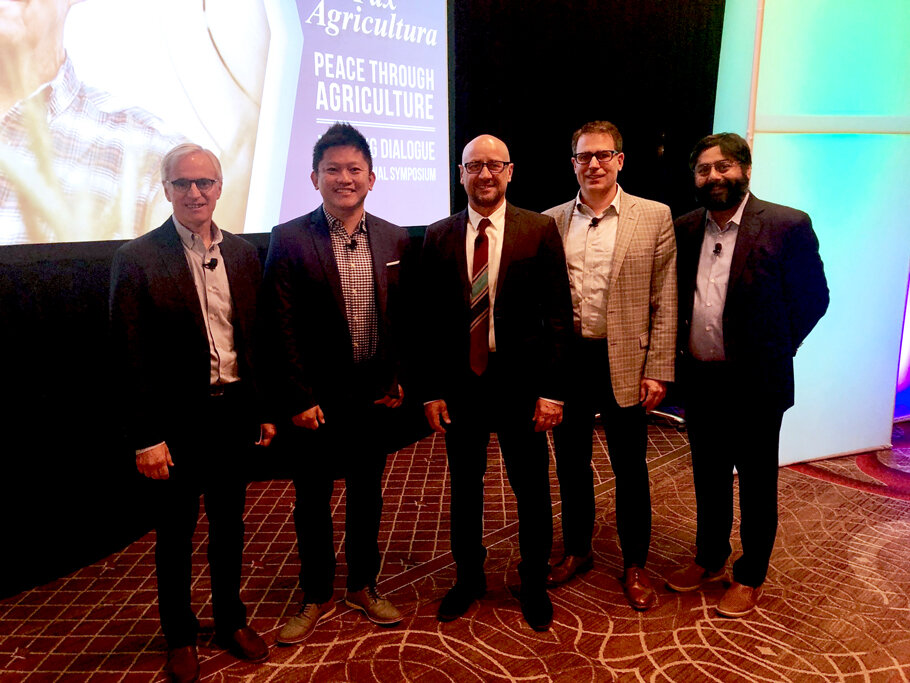By Han Chen, CEO, ZeaKal
I had the honor of speaking at the 2019 World Food Prize, the foremost international honor recognizing the achievements of individuals who have advanced human development by improving the quality, quantity or availability of food in the world. The event was truly inspirational and I wanted to share my personal thoughts and takeaways from the dialogue in Des Moines for those that couldn’t attend.
The theme of this year’s symposium was “Pax Agricultura” or Peace Through Agriculture. One of my most memorable moments was a quote from Dr. Norman Borlaug, the creator of the World Food Prize. Dr. Borlaug, a Nobel Prize Winner, is often called the father of the “Green Revolution” -the term coined for a series of biological and chemical innovations that increased agricultural productivity in the early to mid 20th century. Through his work creating high-yield cereals, Dr. Borlaug is credited with saving over a billion people worldwide from starvation. During his life, Dr. Borlaug believed and tirelessly worked towards ending world hunger. He proclaimed, “Food is the moral right of all who are born into this world”.
As I listened to the stories of political destabilization and genocide around the world in countries such as Rwanda and Cambodia as a direct result of food insecurity, it became obvious that even today millions of people are still denied this basic human right. Even for those of us fortunate enough to live in developed nations, what separates us from famine is only one or two bad growing seasons.
It’s not all gloom and doom. After spending time among so many passionate scientists, entrepreneurs, farmers and executives, I left feeling confident that the ingenuity and perseverance of humanity will stave off the imminent threat of food insecurity once again. Alongside several other startup executives, I had the honor of sharing my own innovation journey, my origin story if you will! At ZeaKal we are doing our part by improving plants to soak in more sunlight and eat up more carbon dioxide to sustainably produce more nutritious food and feed.

Seeing the CEOs of Corteva, Bayer and Syngenta on stage together with a shared commitment to feeding the world showed me that we are all united to greater purpose beyond profit. Hearing stories from Midwest farmers – who grow crops that nourish families across the world – renewed my faith in the human spirit that transcends borders and politics. Finally, after meeting students from the World Food Prize’s Global Youth Institute, I am confident that the future of science, business, and policy is in good hands. I firmly believe, that together, we will be able to face the food security challenges posed by a growing population and increased climate volatility.
However, despite our united efforts , it was sobering to acknowledge the challenges that we collectively identified. In the next 30 years, we will have to feed nine billion people. This is by far the greatest challenge of our time. The global agricultural system will have to increase productivity by 70% to meet this need. This will mean producing more food in the next 30 years than humanity has produced cumulatively since the advent of agriculture ten thousand years ago. To put this into a more urgent perspective, we have 30 growing seasons remaining to create drastic stepwise increases in productivity that exceed the advances garnered from all previous innovation in agriculture.
While I am confident that the technical solutions will come, the implications of the scale of progress we must make means that we must also overcome the man-made obstacles to innovation. Obstacles such as protectionist trade policies, destabilizing nationalistic politics and the prevalence of anti-science misinformation. Climate volatility, arable land loss and crop failures are unaffected by alternative facts, national borders or election cycles. It is a global problem that must be addressed with global solutions that engage us all. For those of us who live in privilege, our islands of prosperity will continue to shrink as the seas of poverty continue to swell. We owe it to humanity to stand up to these challenge in order to uplift communities that are suffering.
As an industry, agriculture has historically not done a very good job of letting our voices be heard. Most of us focus on the mission and believe it to be self-explanatory. In the U.S., our own success in many ways contributed to the problems we now face. With less than 2% of the population producing food for the entire world, the farm has moved further away from the dinner table. Consumers have never been more disconnected from where their food comes from. Nor do they understand how fragile the entire system is, if not for the constant vigilance of our farmers. In that vacuum, we have allowed misinformation to spread. We have allowed misguided activism to erode trust in our institutions and call into question the integrity of those who are at the front line of guaranteeing the basic human right of food security. We have allowed food to become a bargaining chip in politics.
Last week, a thousand voices gathered in Des Moines to speak in unison, but our voices need to reach millions more. We have a very short time to transform how we produce food, fiber, and even energy. We are doing good work, but we must learn to listen and communicate to stakeholders outside our industry, eliminate our personal prejudices and misconceptions, look beyond our national borders. It is cooperation rather than competition that will guide humanity into the next century.
